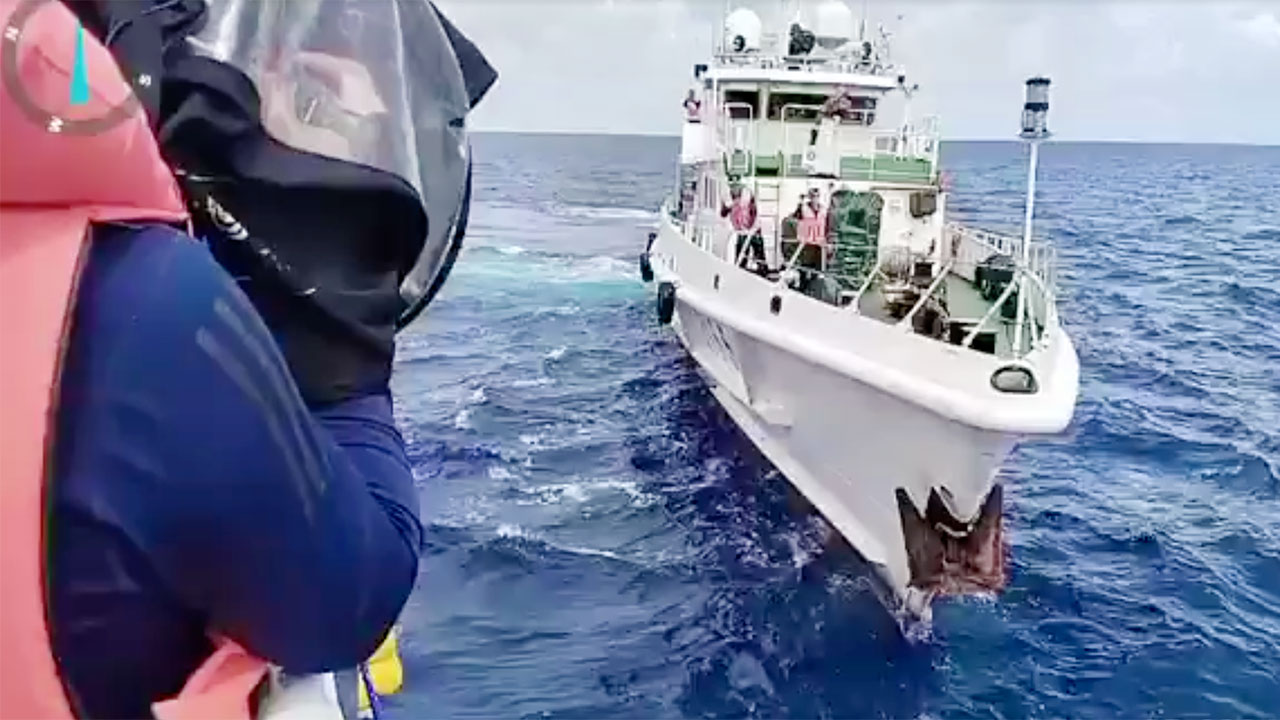China’s actions in South China Sea patently illegal — PHL Defense chief

CHINA’S actions in the South China Sea are “patently illegal,” the Philippines’ Defense chief said on Monday after a clash in disputed waters on Sunday over what Manila said was a resupply mission for fishermen.
“We have to expect these kinds of behavior from China because this is a struggle,” Defense Secretary Gilberto Eduardo C. Teodoro, Jr. told reporters. “We have to be ready to anticipate and to get used to these kinds of acts of China which are patently illegal as we have repeatedly said.”
The Chinese Embassy in Manila did not immediately reply to a Viber message seeking comment. Monday is a public holiday in the Philippines.
Manila’s South China Sea task force accused Chinese vessels near Sabina Shoal of ramming and using water cannons against a Philippine fishery vessel transporting food, fuel and medicine for Filipino fishermen.
The Chinese Coast Guard said the Philippine vessel “ignored repeated serious warnings and deliberately approached and rammed” China’s law enforcement boat, resulting in a collision.
Asked if the latest incident would trigger treaty obligations between the United States and the Philippines, Mr. Teodoro said: “That is putting the cart before the horse. Let us deter an armed attack, that is the more important thing.”
United States Ambassador to the Philippines MaryKay L. Carlson denounced the “unlawful and aggressive conduct” by the Chinese Coast Guard.
“Unsafe, unlawful and aggressive conduct by the PRC (People’s Republic of China) disrupted a legal Philippine mission, endangering lives — the latest in multiple dangerous actions by the PRC,” she said in an X post on Sunday evening. “We are steadfast in supporting our Filipino friends, partners and allies.”
“You can’t even trust them (China) to show simple decency,” Senator Juan Miguel F. Zubiri said in a statement. “We condemn this latest act of aggression displayed by China and protest their actions on Philippine territory.”
The government should continue fighting for Philippine sovereignty in the South China Sea and “uphold our territorial integrity and our right to our exclusive economic zone,” he added.
In a statement on Sunday afternoon, the country’s task force on the West Philippine Sea said Chinese maritime vessels blocked a humanitarian resupply mission by the Bureau of Fisheries and Aquatic Resources’ BRP Datu Sanday for Filipino fishermen.
European Union (EU) Ambassador to the Philippines Luc Veron on Sunday condemned what he called “dangerous maneuvers by the Chinese government naval assets.”
“The EU trusts that respect for international law including UNCLOS (United Nations Convention on the Law of the Sea) is essential in the South China Sea as anywhere else,” he said in a statement.
US officials including President Joseph R. Biden have reaffirmed Washington’s “ironclad commitment” to aid the Philippines against armed attacks on its vessels and soldiers in the South China Sea.
“Everybody is too focused on armed attack, let’s make ourselves strong enough so that does not happen,” Mr. Teodoro said.
FLARE TESTS
Also on Monday, the Philippine military said it had tested flares within the country’s exclusive economic zone in the South China Sea, days after urging China to “immediately cease all provocative and dangerous actions” after accusing it of deploying flares from China-occupied Subi Reef on Aug. 22 while a Manila aircraft was conducting patrols.
The same aircraft “faced harassment” from a Chinese jet fighter while it was conducting a surveillance flight near Scarborough Shoal on Aug. 19, the Philippines’ South China Sea Task Force said in a statement at the weekend.
Philippine military chief Romeo S. Brawner, Jr. said he was aboard a Philippine Air Force plane that practiced its flare capabilities on Friday.
“Our flares were working,” he told reporters on the sidelines of a ceremony for National Heroes’ Day in Taguig City.
Raymon M. Powell, a fellow at Stanford University’s Gordian Knot Center for National Security Innovation, said Subi Reef and other South China Sea features that China had converted into military bases have served as “key power-projection platforms” against its neighbors.
The Philippines should have paid “much more attention” to China’s reclamation and militarization of its features, he said in an X message.
“One reason China is able to threaten places like Pag-asa Island and Second Thomas Shoal and Sabina Shoal is because it can present its forces from these nearby bases,” he said.
Mr. Powell said Chinese President Xi Jinping’s assurance to former US President Barack Obama that they would not militarize the South China Sea had “served the purpose to buy China time to complete its project.”
The clash on Sunday has overshadowed efforts to rebuild trust and better manage disputes in the South China Sea after months of confrontations.
China claims sovereignty over nearly all of the South China Sea, including areas claimed by the Philippines, Taiwan, Malaysia, Indonesia, Vietnam and Brunei.
An international arbitral tribunal in 2016 ruled that China’s claim was illegal. — John Victor D. Ordoñez and Kyle Aristophere T. Atienza with Reuters



